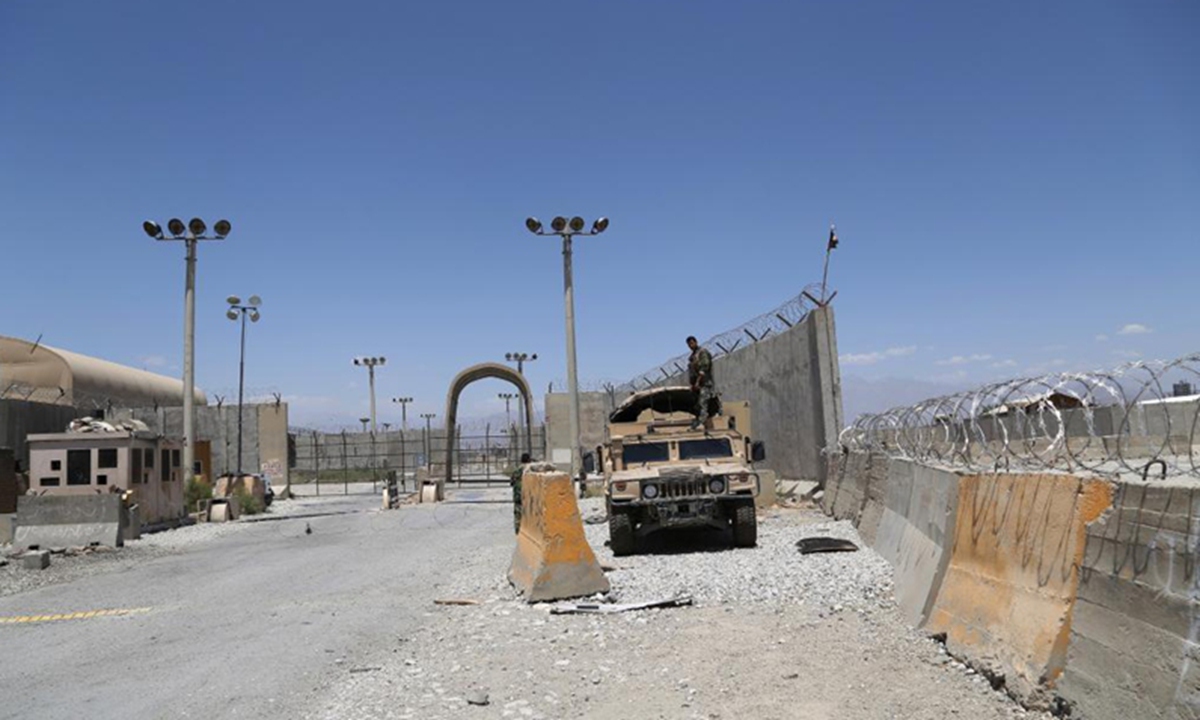
Photo taken on July 2, 2021 shows the gate of Bagram Airfield after all U.S. and NATO forces evacuated in Parwan province, eastern Afghanistan. All U.S. and NATO forces in Afghanistan have evacuated the Bagram Airfield near the Afghan capital Kabul, handing over the largest coalition base to the Afghan government troops, a spokesperson of the Afghan Defense Ministry confirmed on Friday.Photo:Xinhua
The US and India are reconciled to "ceding their influence in Afghanistan" to China, Pakistan and Taliban so long as the territory is not used to nurture terrorist groups and foster terrorism, officials from Washington and New Delhi indicated on Friday, according to Times of India. However, such remarks fail to conceal the US' and India's self-interest.
Afghanistan is an independent sovereign state and belongs to the Afghan people. To talk of Kabul as a strategic pawn and hand it to other countries as if it is a "gift" is not the posture of a responsible great power. It also shows the arrogance of the hegemonic mind-set of some countries and proves the fact that the US and India are using Afghanistan and the Afghan people for their own geo-strategic purposes.
Besides, the US invaded Afghanistan 20 years ago under the pretense of anti-terrorism. But the number of terrorist groups in Afghanistan has increased from single digits to more than 20 over the past two decades. The US has not achieved its objectives against terrorism, nor has it fulfilled its post-war responsibilities and obligations. The US was supposed to bear the main responsibility for reconstruction in Afghanistan. By saying it wants to cede influence to Pakistan and China, the US is preparing to shed itself of this responsibility.
From another perspective, these statements by the US and Indian politicians prove that the pursuit of geopolitical goals and influence in Afghanistan is doomed to failure. This is why Afghanistan is called the "Graveyard of Empires." Years of geopolitical rivalry between India and Pakistan in Afghanistan and US attempts to use Afghanistan for influence have come to nothing.
The idea of ceding influence to anyone is irresponsible and full of geopolitical overtones. On the other hand, the arrogance associated with certain countries' foreign policies, as if Kabul were a gift, reflects the hypocritical nature of US-Indian diplomacy.
In fact, the US and India are not really willing to "cede their influence in Afghanistan to Pakistan and China." They are saying this to shift the task of anti-terrorism to China and Pakistan, and to make China and Pakistan the scapegoats for the failure of the US and India in their fight against terrorism.
Whether Afghanistan's future is peaceful or turbulent, developed or impoverished, the goals of the US and India in Afghanistan will not change. Behind this statement is a feeling of loss and frustration of the US and India, but it does not mean that they want to give up their interests in the region.
However, the US cannot simply abdicate its responsibility by pulling out from the region or leaving the mess to other countries. US' withdrawal from Afghanistan is only the beginning of the liquidation.
India is making such statement following the US, on the one hand, it wants to heap pressure on the Taliban, hoping that Afghan people can give something in return to India. The Indian government has adopted opportunism. Also, New Delhi wants to coerce the Taliban to meet the demands of the US and India, otherwise it may cancel investment in Afghanistan.
India is waiting to see how the Taliban will manage Afghanistan's reconstruction and what cards are left in its hands to influence Afghanistan. India wants to take advantage from the situation. If New Delhi feels that there is a trend of recognizing the Taliban among the international communities, then it will also wait for the opportunity to face the reality.
For the US, anti-terrorism was never its real purpose, but an excuse to intervene in another country. With the US withdrawal from Afghanistan, there will be less domestic attention to Afghanistan's security situation in the US. It is likely that US investment in the region will decrease.
The anti-terrorism mess is left to Afghanistan itself, or neighboring countries like China and Pakistan. South Asia has great significance to the US' anti-terrorism strategy - anti-terrorism is only important when it fits with the US' own interests.
It is China that binds the US and India together. Washington and New Delhi believe that if they can pass the buck to China and bring China down, then why not?
The author is head of the Department for Asia-Pacific Studies at China Institute of International Studies. opinion@globaltimes.com.cn




